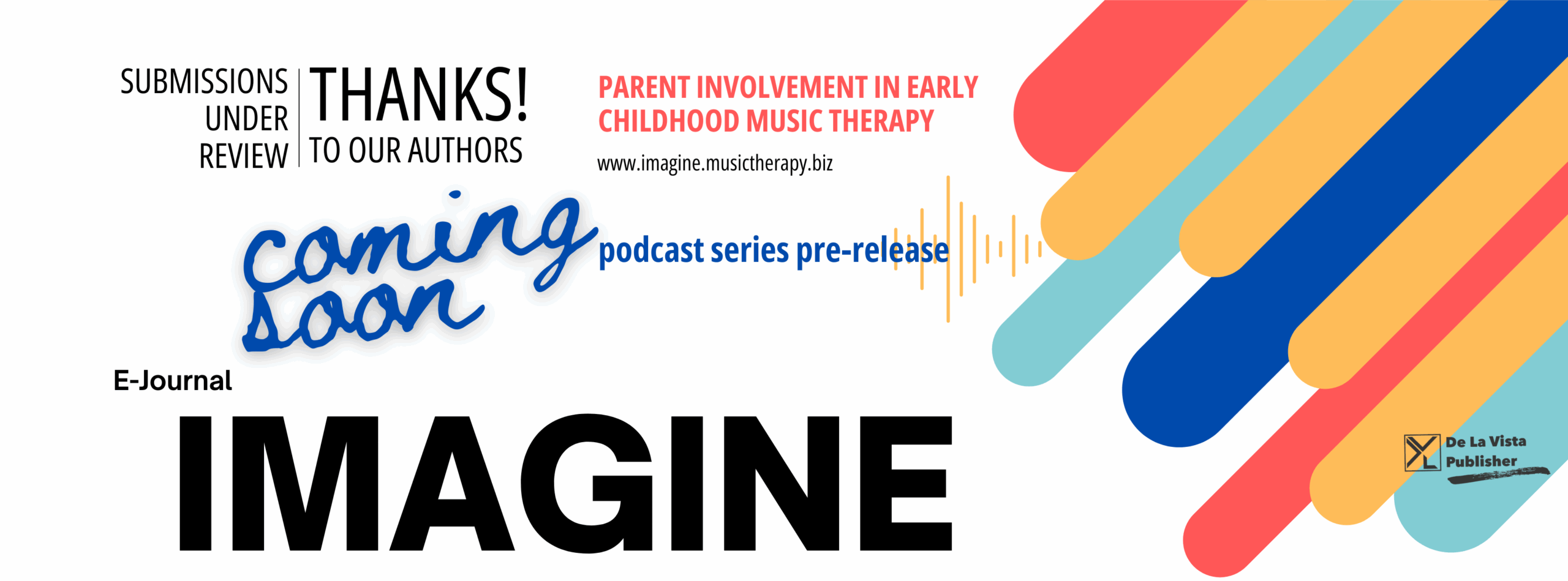Authors

Aiming to launch imagine 2025 on September 1, 2025
Day(s)
:
Hour(s)
:
Minute(s)
:
Second(s)
2025 Call for Submission
🌟 Share Your Story: Parent Perspectives on Early Childhood Music Therapy 🌟
imagine 2025 will explore the dynamic and evolving role of parents in early childhood music therapy. With the recognized understanding that family involvement is key to maximizing therapeutic outcomes, this issue seeks manuscripts demonstrating successful parent-engagement practices, practical guidance on training parents in music-mediated interventions, and the impact of family-centered approaches on children’s development and well-being.
Submissions may address one or more of the following themes:
- Building Bridges: Strategies for fostering positive and collaborative relationships between music therapists and families.
- At-Home Music Therapy Techniques: Practical methods for teaching parents simple, effective music-mediated strategies to use with children in their everyday lives.
- Family Dynamics in Therapy Sessions: Insights into how the presence and involvement of parents affect session dynamics, therapeutic goals, and child outcomes.
- Research and Outcomes: Studies or case reports on the efficacy of parent-inclusive music therapy, including the effects on child development, family bonding, and overall family well-being.
- Addressing Challenges: Real-world insights into challenges such as overcoming cultural differences, managing time constraints, addressing varied levels of engagement, or state and federal policy issues.
Potential Authors:
Early childhood music therapists, developmental psychologists, parent-child interaction specialists, early childhood researchers, and parents who have engaged with music therapy.
🗓️ Submission Open Until: April 15
📍 Submission Portal: www.imagine.musictherapy.biz
Here are some potential topics – let us know which one you picked to avoid replications.
- Our Journey with Music Therapy: A Parent’s Perspective 📖 Share your personal story of how music therapy has shaped your child’s development, impacted your family life, and transformed your role as a caregiver. Reflect on challenges, unexpected benefits, and moments of growth.
- Bringing Music Therapy Home: Simple Techniques That Made a Difference 🛠️ Provide practical, at-home music-mediated intervention tips you have learned and how you have woven these techniques into your daily routines. Inspire other parents with accessible, hands-on strategies. TAKEN BY 2025 AUTHOR
- A Day in the Life: Music Therapy in Our Family Routine🎵 Offer a peek into your family’s day-to-day life and how music therapy has become a part of it. Share relatable examples of using music to manage emotions, transitions, or foster family bonding.
- Learning to Collaborate: How Music Therapy Brought Us Closer as a Family 🤝 Discuss the dynamics of working with a music therapist and how collaboration helped strengthen your family unit. Share insights about trust, communication, and mutual learning in the therapeutic process.
- Advice for Parents New to Music Therapy: What I Wish I Had Known 💡 Provide guidance for families just starting their music therapy journey. Share lessons you have learned about managing expectations, finding support, and maximizing every session. TAKEN BY 2025 AUTHOR
- When Cultural Values and Music Therapy Meet: Our Family’s Experience 🌍 Reflect on how music therapy aligned (or did not align) with your cultural values and traditions. Highlight adaptations by the therapist, lessons learned, and your family’s unique perspective on therapy.
- Connecting with My Child through Music: A Parent’s Guide to Making Therapy Fun 🎉 Focus on the joys of music therapy and how it has fostered connection with your child. Include specific games or playful activities to inspire others in making therapy engaging.
- Parent Involvement in Music Therapy: Balancing Work, Life, and Therapy ⏳ Explore the challenges of balancing a busy life while staying involved in your child’s therapy. Share time-management tips, support systems, and how you prioritize your involvement.
- From Skeptic to Believer: How I Came to See the Power of Music Therapy 🔄 Reflect on your initial skepticism about music therapy and what changed your perspective. Share your journey to provide reassurance and hope for new families.
- The Long-Term Impact of Music Therapy on Our Family 📆 Discuss the lasting effects of music therapy over years of participation. Reflect on your child’s developmental progress, family dynamics, and the enduring benefits of therapy. TAKEN BY 2025 AUTHOR
imagine
imagine is an interactive e-journal that serves as the primary resource for early childhood music therapy (ages: zero to five) and publishes articles with a sound base in research and practice.
Style
The writing style should be reader friendly (see http://centerforplainlanguage.org) and written for early childhood practitioners in music therapy and related fields. Descriptions of individuals with disabilities need to reflect contemporary terminology. Please note, we do not accept “first person” written manuscripts as text-based articles (see APA writing style), but consider authors’ voice and opinions in podcast format.
Form
Manuscripts need to be prepared in accordance with the Publication Manual of the American Psychological Association, Seventh Edition (2020) or the APA Formatting and Style Guide (7th Edition) at the Purdue Online Writing Lab and should range between 250-2000 words (including references, tables and figures). All submissions must include title, name(s) of author(s), professional credentials, institutional affiliation, three-sentence bio with photo for each author, email address, and a short list of references (including digital object identifiers – DOIs) or recommended resources. The imagine team will return manuscripts with extensive APA formatting errors to authors for correction before beginning the editing process. Please save the manuscript as a Microsoft Word Document (.docx) and attach it to the online submission. Please note, authors are expected to indicate that the manuscript is an original submission and not under review by another journal or published elsewhere.
Additional APA resources:
AI Policy
imagine supports the ethical use of AI as a valuable asset in the writing and publishing process!
AI can be a great tool for idea generation, research synthesis, language translation, and simplifying complex information into plain language, but it cannot replace human creativity and critical thinking.
- Use AI Transparently: If AI tools helped with writing, translating, or structuring your work, disclose the use in the methods or acknowledgments section.
- Cite Smartly: AI can assist in summarizing sources, but always verify content and cite original sources, not AI-generated material.
- Ensure Accuracy & Integrity: Double-check facts, avoid plagiarism, and confirm all citations are real and correctly attributed.
- AI is a Tool, Not an Author: AI cannot be listed as an author on your submission.
International Submissions
We welcome international submissions. All manuscripts need to be prepared in English language. Authors whose first language is not English are strongly advised to have a native English speaker proofread the manuscript before submitting it, or to consider using professional editing services. Please note, translation services are the responsibility of the author and are not provided by imagine.
Multimedia
Inclusion of images, audio, and video recordings of clients and authors that are in compliance with professional Code of Ethics and relevant to the topic of the manuscript are strongly encouraged. Examples, at all times, should portray the individuals therein in a respectful way. However, authors are solely responsible for the content and release of any media included in the published article and are asked to sign the imagine Multimedia License Agreement. Clear images (jpg file, maximum of 10 MB), audio (mp3 file; maximum of 10 MB), podcasts (mp3 file; maximum of 100 MB), and videos (landscape; mp4; maximum of 180 MB) must be submitted online. Please indicate where the multimedia should be placed in your manuscript by saying [INSERT XX ABOUT HERE]. Note: Audio podcasts should be no longer than 10 minutes.
Review Process
Receipt of the submission will be acknowledged electronically. After the April 15th submission deadline, the editorial team will review the manuscripts and come back to the author(s) with editorial suggestions or a notice of rejection within a couple of weeks. Manuscripts are edited for accuracy, clarity, length, spelling and style. After the revisions, the author(s) will have the chance to a) revise the manuscript, and b) proofread a preliminary print layout (pdf file) of the article. Author(s) are expected to respond to the editorial team within the given timeline in order to meet the publication deadline. Authors should be aware that the editorial team maintains the right to reject invited manuscripts that are not in compliance with the above (including revisions) or do not meet the inetntion of the special issue. Please note, authors are not financially compensated. The interactive e-journal does, however, provide authors with international exposure and a wide range of readership.
Copyrights
After an article is published, authors retain ownership of the article. The author has the right to distribute the article and have reprinted it elsewhere. All reprinted articles must include the following statement: Reprinted from [fill in blank] issue of imagine, the early childhood music therapy interative e-journal published by de la vista publisher.
Disclaimer
The opinions and information contained in this publication are those of the authors of the respective articles and not necessarily those of the publisher, editor-in-chief, or editorial team. Consequently, we assume no liability or risk that may be incurred as a consequence, directly or indirectly, of the use and application of any of the contents of this publication.

Be Assured, We Care About Your Work.
Editorial Team
Editor
Petra Kern, Ph.D., MT-BC, MTA, DMtG
Associate Editor
Dana Bolton, MEd, MMT, MT-BC
Assistant Editor
Erin Shina, MT-BC

Assistant Editor
Alex Ruffner, MS, MT-BC